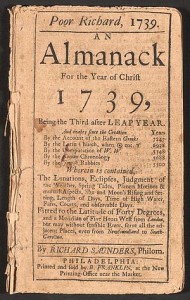Beer is proof that God loves us and wants us to be happy.
While the above quote it consistently attributed to the American icon Benjamin Franklin, it would appear that this widely held public belief is, in fact, a case of wishful thinking and unfortunate misinformation. However, the quote is not a total fallacy in essence; Franklin did have a considerable amount to say on beer (largely negative, as one may see in his Autobiography), but his true love affair was with wine. In a letter to his French friend Andre Morellet in 1779 (who was, like Franklin, a true Renaissance man, being adept and learned in many trades and studies), Franklin waxed poetic about wine:
We hear of the conversion of water into wine at the marriage in Cana, as of a miracle. But this conversion is, through the goodness of God, made every day before our eyes. Behold the rain which descends from heaven upon our vineyards, and which incorporates itself with the grapes to be changed into wine; a constant proof that God loves us, and loves to see us happy!
As such, Franklin did, essentially, say that an alcoholic beverage was “proof that God loves us, and loves to see us happy”, but it was wine rather than beer that he was discussing (and his actual language is considerably more eloquent than the popularized quote). The importance of this is debatable. While the quote is not grossly misinterpreted or misremembered, it is still a considerable deviance from Franklin’s legitimate words and as such is puzzling. Why his words have been twisted and reimagined in this way is somewhat unanswerable, but the vast recognition of the quote is telling as to its perseverance in the public imagination.
Looking to the New York Times archive alone one can find countless articles discussing beer, brewing, and other such related topics, all of which manage to integrate this false quote at some point or another, often not bothering to attribute it to a source at all. In a Times article entitled How Beer Gave Us Civilization this quote is contributed to Franklin as something he “supposedly” said, but nothing else is said about it. Even those who insinuate their doubt as to this quote’s authenticity manage to further ingratiate it into popular culture! However, the real point here is that I was hard pressed to find a single Times article covering the subject of beer which didn’t feature this quote, branding it authentic or not. This alone is telling as to the ingrained popularity of the misquote.
Still, how this started and why it stuck are likely unanswerable questions. It could easily be a misquote born of faulty memory, which would by no means be uncommon. There is also something to be said for Franklin’s prominence in American history and his status as a “true” American figure. There is quite possibly a public urge to paint such a figure as not only one of lofty aspirations and achievements but as relatable (something which is not particularly difficult to do with a figure such as Franklin, considering his upbringing and many of his more base, humorous writings). Whatever the reason, though, it was not beer that Franklin exalted–it was wine.



